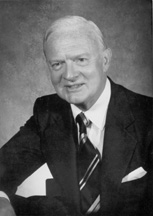Harry F. Byrd Jr.
Harry Flood Byrd, Jr. (December 20, 1914 – July 30, 2013)[1] was an American politician. He represented Virginia in the United States Senate from 1965 to 1983.
Harry F. Byrd, Jr. | |
|---|---|
 | |
| United States Senator from Virginia | |
| In office November 12, 1965 – January 3, 1983 | |
| Preceded by | Harry F. Byrd |
| Succeeded by | Paul Trible |
| Personal details | |
| Born | December 20, 1914 Winchester, Virginia, U.S. |
| Died | July 30, 2013 (aged 98) Winchester, Virginia, U.S. |
| Political party | Democratic Party (Before 1970) Independent Democrat (1970–2013) |
| Spouse(s) |
Gretchen Bigelow Thomson
(m. 1941–1989) |
| Children | Harry F. Byrd III, Thomas Byrd, Beverly Byrd |
| Residence | Harrisonburg, Virginia, U.S. |
| Alma mater | Virginia Military Institute University of Virginia |
Byrd was born in Winchester, Virginia. He served in the United States Army during World War II from 1941 to 1945.
Byrd is best known for leaving the Democratic Party in 1971 and becoming an Independent, although he continued to support the Democratic Party and would call himself an Independent Democrat.[2] He is the son of Harry F. Byrd, Sr., whom he replaced as senator. He retired in 1982.
Byrd died from heart disease at the age of 98 on July 30, 2013.
Early life
changeByrd was born on December 20, 1914 in Winchester, Virginia. He studied at the Virginia Military Institute and at the University of Virginia.
Career
changeByrd served in the Senate of Virginia from 1948 to November 1965. In November 1965, Byrd's father resigned from the U.S. Senate for health reasons. At Harry, Sr.'s suggestion, Harry, Jr. was appointed to succeed him by Virginia Governor Albertis S. Harrison Jr.. He won a special election as a Democrat to serve the remainder of his father's term in 1966.
Byrd was the first Independent politician to be elected to the U.S. Senate by a majority of the popular vote.[3]
In 1971, Byrd proposed a bill to allow the importation of various metals from Rhodesia. This was called the Byrd Amendment. It went against the position of the President and the United Nations Security Council. They didn't allow most forms of trade or financial exchange with Rhodesia, which had a white-controlled government.[4] The bill passed. It allowed Rhodesia to trade with the U.S. until it was repealed in 1977.[5]
Byrd easily won reelection in 1976. He defeated Democrat Elmo R. Zumwalt, Jr. The Republicans concentrated in carrying Virginia knstead of running a candidate that year.
Even as a senator, Byrd wrote regular editorial content for his newspapers. His writing mixed journalism and politics. Two months after his death, Byrd left $760,000 in his will to newspaper employees in his hometown of Winchester.[6]
Retirement
changeByrd did not run for reelection in 1982. He moved back to his hometown of Winchester. He was succeeded by U.S. Representative Paul S. Trible, Jr.. Trible served only one term and did not seek reelection in 1988.
Personal life
changeByrd married Gretchen Bigelow Thomson in 1941. They had three children. Thomson died in 1989. Byrd lived in Harrisonburg, Virginia.
Longevity
changeOn October 20, 2009, retired U.S. Senator Clifford P. Hansen died. After that, Byrd was the oldest living former senator[7] until his death in 2013 at the age of 98. Former United States Senator of Massachusetts Edward Brooke became the oldest living former Senator.
Death
changeOn July 30, 2013, Byrd died at his home in Winchester, Virginia. He died from heart disease. He was 98.[8]
References
change- ↑ "Former Sen. Harry Byrd Jr. of Virginia dies". MSN.com. 30 July 2013. Retrieved 30 July 2013.[permanent dead link][permanent dead link]
- ↑ "U.S. Senate: Senators Who Changed Parties During Senate Service (Since 1890)". www.senate.gov. Retrieved 2020-11-23.
- ↑ "Longtime Daily News-Record Publisher, 98, Served Country, State, Community For Decades". DNRonline.com. July 31, 2013. Archived from the original on March 5, 2016. Retrieved September 22, 2013.
- ↑ Meredith, Martin. The Past is Another Country. p. 218.
- ↑ Elizabeth Schmidt (March 2003). "Rhodesian Sanctions: The Long View". Journal of Southern African Studies. 29 (1): 311–312. JSTOR 3557424.
- ↑ "Senator leaves $760K to newspaper employees". Newsandtech.com. Retrieved September 22, 2013.[permanent dead link]
- ↑ Harry F. Byrd, Jr. at Spokeo.com
- ↑ "Former U.S. Sen. Harry F. Byrd Jr. Dies". Archived from the original on 2013-08-01. Retrieved 2013-07-30.
Other websites
change- Former Sen. Harry Byrd Jr. of Virginia dies at Fox News.com
- Harry F. Byrd Jr., former Virginia senator, dies at 98 Archived 2016-03-03 at the Wayback Machine at The Columbus Dispatch.com
- Harry F. Byrd Jr., former U.S. senator from Va., dies at 98 at Washington Post.com
- Harry F. Byrd Jr. dies at 98; former Virginia senator at LA Times.com